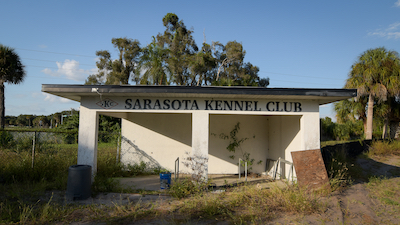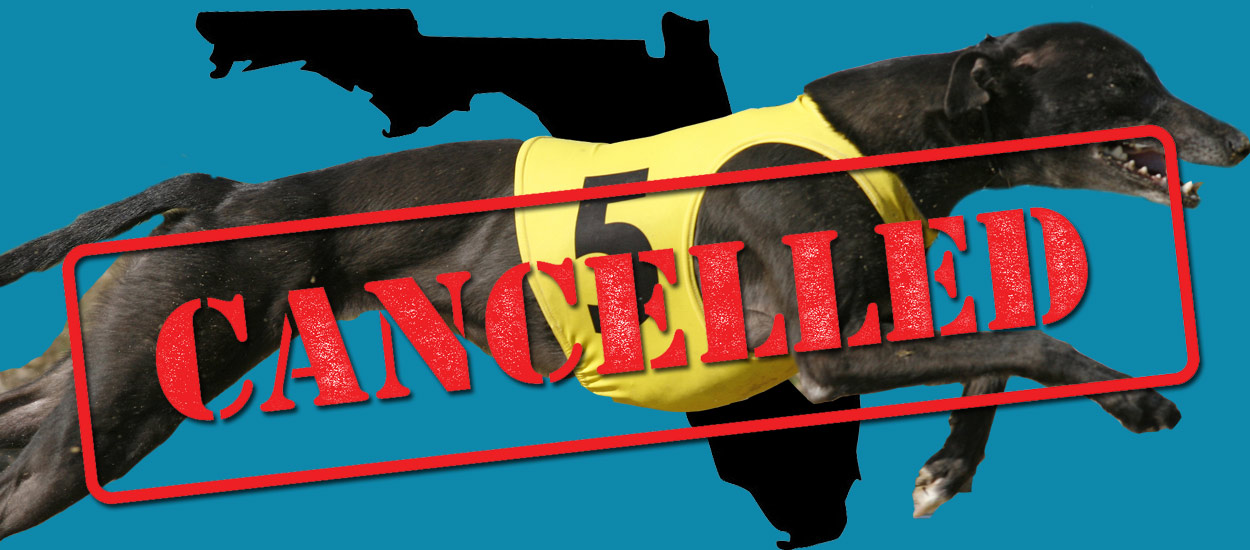New Year's Eve was the last greyhound race in Florida, won by Big Brush, after Amendment 13 took effect that banned greyhound racing. For those unfamiliar with the sport, a lure, usually a stuffed rabbit or a bone, is attached to a mechanical arm and is set loose on a rail. As the lure passes by the dogs in a starting gate, the gates are open. The lure makes a squeaky noise as it circles the track, and the greyhounds chase the lure by sight and by sound. It is too fast for the dogs to catch and eventually the lure goes into an open box after the dogs cross the line. Many of the public often find it comical when the dogs crash into each other at the end of the race, trying to figure out what happened to the rabbit but animal rights groups have often cited that as cruel and inhumane. In its early days, live bait was used as the lure in what was called "coursing", but that has been illegal for decades. Like with horse racing, the public can wager on the outcome of the race, but unlike horse racing, it was never adapted by nobility and was often seen as a poor man's sport, unlike horse racing which has been called the sport of kings.
Many animal rights groups said that greyhound racing is cruel, since dogs live in cramped and uncomfortable arrangements and often the dogs would become quite sick or die from injuries. But dog owners and the Greyhound Kennel Associations argued nothing could be further from the truth. Most greyhound owners contend that the dogs are treated well, have excellent living arrangements, are well fed, and receive a full complement of vaccines. And if a dog does become ill, they say they are given the best veterinary care. It has also been noted by some greyhound fans and supporters that unlike horses, if the dog breaks a leg during a race (which is rare) or have other injuries, the dogs can be cured easily with traditional medicine and physiotherapy, unlike horses that usually have to be put down. Pictures and videos from kennels and owners, however, show something else.  The anti-greyhound racing group, Grey2K, has illustrated pictures of dogs being kept in small cages for more than 20 hours a day on their website along with disturbing videos of malnourished and abused dogs. They also released reports showing that less than 10% of racing greyhounds live to the age of 12 and that dogs are usually abandoned when they are deemed no longer useful. Dogs generally start racing at around age 1 ½ and race for two to four years, every few days. Consequently, in July of 2020 Grey2K petitioned and applauded California representative Tony Gardenas for introducing bill H.R. 7826 titled "The Greyhound Protection Act of 2020", which would amend the Wire Act to make betting on greyhound racing illegal in all states. The logic behind the bill is that greyhound tracks rely on wired and internet technology to operate, so making those forms of communication illegal would effectively end all greyhound racing in the U.S. The full text of the bill can be read here:
The anti-greyhound racing group, Grey2K, has illustrated pictures of dogs being kept in small cages for more than 20 hours a day on their website along with disturbing videos of malnourished and abused dogs. They also released reports showing that less than 10% of racing greyhounds live to the age of 12 and that dogs are usually abandoned when they are deemed no longer useful. Dogs generally start racing at around age 1 ½ and race for two to four years, every few days. Consequently, in July of 2020 Grey2K petitioned and applauded California representative Tony Gardenas for introducing bill H.R. 7826 titled "The Greyhound Protection Act of 2020", which would amend the Wire Act to make betting on greyhound racing illegal in all states. The logic behind the bill is that greyhound tracks rely on wired and internet technology to operate, so making those forms of communication illegal would effectively end all greyhound racing in the U.S. The full text of the bill can be read here:
H.R.7826 - 116th Congress (2019-2020): Greyhound Protection Act of 2020 | Congress.gov | Library of Congress
The sport has had declining interest for some time, although an amusing fact is it received new interest for a brief period after the 1989 Simpsons episode titled "Simpsons Roasting on an Open Fire" aired where Homer, after leaving his job as a mall Santa, and with Bart in tow, bet on 99-1 shot Santa’s Little Helper and then brought it home to the family as a Christmas present when the owner of Santa’s Little Helper abandoned the dog for "finishing last for the last time." Nevertheless, since 2001, wagering on greyhound racing in the United States has declined by nearly 67% and shows no sign of getting better. Florida, Alabama and Texas have stopped offering greyhound racing and currently only West Virginia, Arkansas and Iowa provide live racing and wagering. Canada and most states never legalized greyhound racing.
Other countries that offer greyhound racing are Australia, Ireland, Mexico, New Zealand and the U.K. South Africa also has greyhound racing, although betting on it is not allowed in that country due to concerns with race fixing. Like with the United States, greyhound racing has been called to task in the other countries (except Mexico), for what is deemed as poor animal welfare. Some states in Australia banned greyhound racing in 2016 after a report was aired on TV in 2015 showing how some owners were using "live baiting" to try and make their greyhounds faster and showed mass graves of greyhounds who could no longer race and outlived their usefulness. The report said the owners often shot the dogs and threw them out because they were deemed no longer worth the upkeep. As for live baiting, it was revealed that some dog owners took live piglets, possums, and rabbits, put them on a hook and let them run free. And after the greyhound caught them, they could kill and eat the innocent animals. The owners claimed the taste for blood made the greyhounds run faster because they had an extra incentive to catch the mechanical rabbit, but for decades live baiting has been illegal and considered immoral and inhumane. And owners who were found in violation were subject to fine or imprisonment and a permanent ban from the sport. In 2017, the Australian courts reversed the ban, saying the industry was too important to the lives of many Australians, although they put in new restrictions to protect the greyhounds and other innocent animals. Nevertheless, many animal rights groups in Australia say it isn't enough, since the sport is immoral in principal and needs to be gone for good. New Zealand has implemented similar rules after reports showed disturbing findings, but again animal rights groups and many New Zealand politicians want it banned.
The UK and Ireland are the two countries where greyhound racing is still somewhat popular and, in those countries, there are 19 licensed stadiums that attract close to $100 million U.S. in betting. As with the other countries, there have been concerns related to animal welfare, although there have been no apparent calls for a ban on the sport. Nevertheless in 2018 the Irish Greyhound Board said that they were implementing a new 5-year strategic plan to make the industry more humane and will spend around 16 million euros to make it better. The board published the following update in 2019:
Irish Greyhound Board Welfare & Regulation update: October 2019 The Irish Greyhound Board (IGB) continues to make significant progress in the areas of welfare and regulation under its Strategic Plan 2018-2022.
The Irish Greyhound Board (IGB) continues to make significant progress in the areas of welfare and regulation under its Strategic Plan 2018-2022.
€2 million was spent by the IGB across regulation and welfare in 2018.
An array of care and welfare measures, including a greyhound injury support scheme, the launch of the Greyhound Care Line, an extension of our foster care scheme, the establishment of the Greyhound Care Fund and other initiatives have been introduced in recent months.
Further measures, such as a traceability system for all racing greyhounds and negotiations with international rehoming agencies to rehome more retired Irish greyhounds, continue to progress.
Finding new homes for greyhounds after their racing careers seems to be the biggest focus of all interested parties, including the regulatory boards, kennel associations, animal rights groups and greyhound protection organizations, like Grey2K, and in the United States it is common to see commercials throughout the day on network and cable TV asking Americans to consider adopting a racing greyhound. Some owners say that if the industry is completely banned it will mean the end of the breed, but dog breeders say, like with the whippet, there will always be a demand for the animals, since they can be great pets and still be helpful to hunters and other occupations that require swift dogs.
As for Mexico, there is only one course located in Tijuana and since cockfighting and bullfighting are still offered legally there, it's not surprising that greyhound welfare is not seen as a major concern.
So, it seems like it is only a matter of time before all greyhound racing is gone in the United States and possibly in Australia and New Zealand as well. Employees at the greyhound tracks in Florida were promised jobs in related industries like horse racing and dog owners and trainers have been resigned to the fact that the end was nearing for the sport. Everything runs its course, and and this is one sport that few with a conscience will miss.
Read insights from Hartley Henderson every week here at OSGA and check out Hartley's RUMOR MILL!







































